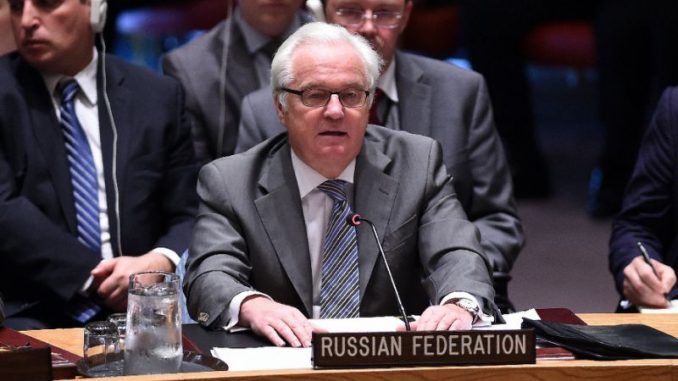
Russia’s UN envoy has questioned the efficacy of the US led counter-terror operation in Iraq, as terrorist activity there has intensified.
Russia is concerned that terrorists seem to have learned to manufacture poisonous substances, Vitaly Churkin said while urging the UN to delve into the origin of chemical agents obtained by militants “via Turkey.”
RT reports:

BYPASS THE CENSORS
Sign up to get unfiltered news delivered straight to your inbox.
You can unsubscribe any time. By subscribing you agree to our Terms of Use
Speaking at Friday’s UN Security Council meeting on Iraq, Russia’s Ambassador to the UN, Vitaly Churkin, commended the Iraqi government’s efforts in combatting Islamic State (IS, formerly ISIS/ISIL), while questioning the role of the international coalition under the leadership of US forces, which he said has not achieved any feasible progress on the ground so far.
“…The dramatic rise in terrorist activity, especially in Bagdad, makes us grow wary and question the efficiency of the activities of the ‘coalition’ which has been calling itself ‘global’ in the recent time due to some reason,” he said, pointing out the rapid expansion of Islamic State’s operations in Libya, Afghanistan, and Europe.
The diplomat emphasized that all interested parties must adhere to the principles of international law in tackling the challenges posed by the global terror threat, while warning against the adoption of “double standards.”
“There should be no room for double standards. All responsible members of the international community must follow a consistent and principled line in countering this absolute evil,” he said.
In the latest developments, it was revealed by US Defense Secretary Ash Carter that an American serviceman, reportedly a Navy Seal, had been killed by enemy fire while on a combat mission near the city of Irbil in northern Iraq. He became the third American to lose his life since the launch of Operation Inherent Resolve, the US-led international coalition formed in 2014 to battle Islamic State terrorists.
Churkin drew attention to the worrisome spread of chemical agents to territories controlled by Islamists, which were allegedly manufactured in Turkey or shipped to it without the right to re-export.
“Poisonous warfare substances are rapidly spreading across the region and are used by terrorists, but some member-states are consistent in turning a blind eye on that,” he stressed, noting that research into the components of the explosive mixtures recovered from terrorists near the Iraqi city of Tikrit, as well as further investigation into their producers and import conditions, indicate that they came from Turkey.
He urged the United Nations to launch a thorough investigation into the incidents, lamenting that there was no indication in its report on Iraq that the UN was doing any investigative work to determine the source of the chemical weapons.
Chutkin reiterated Russia’s proposal to develop an international convention aimed at preventing terrorist chemical attacks that would close loopholes in the Chemical Weapons Convention related to the use of chemical warfare by non-state actors, such as terrorist groups.
Churkin chastised Western countries earlier this week for subverting a UN draft resolution proposed by Russia and China, which called for all countries to report to the UN Security Council and the joint UN-chemical watchdog OPCW (Organization for Prohibition of Chemical Weapons) on any possible attempt by non-government actors in Syria to develop, obtain, or transport chemical weapons.
While the initiative was supported by non-permanent member states of the Security Council, such as Angola and Venezuela, the draft was rejected by some Western powers, including the UK.
“It is regrettable that under conditions when it is necessary to immediately employ all available mechanisms to put a roadblock to the activities of chemical terrorists, some of the United Nations Security Council’s Western members use trumped-up pretexts to block the Russian-Chinese initiative aimed at checking the threat of the production of chemical weapons in Syria and around it by terrorists,” Churkin said on Wednesday.


